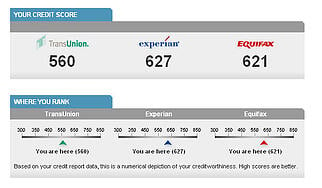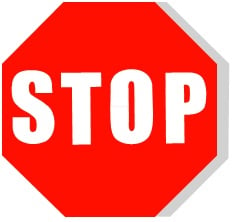Wage garnishment or a bank levy is a terrible situation to be in. If you've been garnished, here are some things you can do to stop the garnishment:
We get calls each week from someone (we are in the Portland, Oregon area) that has been garnished or has been notified by their payroll office that they are going to be garnished.
As if things were not bad enough all ready, WHAT CAN YOU DO NOW?

Just to lay some groundwork...
A WAGE GARNISHMENT can only occur AFTER A JUDGMENT has been awarded to the plaintiff.
A lot of people are mistaken in thinking that just because one of your credit accounts has been charged off and assigned or sold to a collection agency, that they can come after your property.
THAT IS JUST NOT TRUE!
FIRST....
When you get behind on paying your credit accounts on time, there is a sequence of events or a time line that must take place.
You will get calls and/or letters from the original creditor trying to find out what's going on. By-the-way, as long as your account is still with the original creditor, you can't do anything to stop them from calling.
But, once that account is charged off and transferred or sold to a debt collector, you can. I show you how later.
NEXT...
Once the account is placed with a debt collector, you will start getting calls and/or letters from them.
If you have some funds and/or a little money left over to make a reasonable monthly payment, you may want to discuss this with the debt collector rather than just ignoring the calls.
You may be able to work out a SETTLEMENT, which is a reduction of the balance.
This settlement may have to be in a LUMP SUM or possibly in SEVERAL PAYMENTS.
To get an idea of what a SETTLEMENT AGREEMENT looks like, click on the button:
But, if you do not have any additional funds and are sick and tired of the relentless calls, you can put a stop to it now:
If you cannot afford anything to put towards the debt you owe, and you are not taking their calls or responding to their letters, the debt collector may decide to FILE A CLAIM.
An attorney is retained to file the claim in your county's courthouse.
Once the claim is filed, you will receive a SUMMONS. Although this can be a frightening experience, DON'T PANIC!
The summons will state that you the claim against you (you are the defendant) by the creditor or debt collector (this is the PLAINTIFF).
It will also state that if you want to contest the claim, ( called give an ANSWER), you must do so within a short time period (usually 20-30 days after receiving the summons).
If you can prove that you do not owe the debt, then you should give an answer to the court within the time specified.
This costs a hundred dollars or more and must be in the correct legal documentation, so you may need an attorney also.
RECAP.....
- You could not keep up with the payments due on some or all of your accounts. This may be due to a number of circumstances, but here you are.
- You can not work out a reasonable repayment plan or settlement with the original creditor, so you account is assigned or sold to a debt collector.
- You cannot afford a settlement with the debt collector and the debt collector files a claim and you receive a summons.
NOW WHAT??????
Most of the time the plaintiff will be awarded a DEFAULT JUDGMENT by the court.
Once the JUDGMENT has been entered, the plaintiff has the option of seeking a WRIT OF GARNISHMENT to get back what is now owed.
Additional interest, fees and court costs have now been awarded to the plaintiff as well!
If you are employed and receive a check (W-2 wages), then the writ of garnishment is presented to your employer and/or payroll department.
You may be notified, but you may just be shocked to see that your payroll check has been reduced by 25%!
(I'll give you some advice on what you may be able to do about this in a minute.)
If you receive income from commission or what is reported for tax purposes as 1099 INCOME, then the plaintiff may seek to get a bank levy on ONE OR ALL OF YOUR BANK ACCOUNTS!
This can really be DEVASTATING!
We have had people call us after their bank account(s) were depleted and they could not by groceries, pay rent, etc.!
The laws of your state (I am in Oregon and most of my clients reside here) will allow numerous EXEMPTIONS to wage garnishment and/or a bank levy.
Here are some of the "basic" exemptions (I give you a link to a more detailed list below):
- Exempt wages....If you earn less than $1,000 a month, most likely this is exempt.
- All Social Security Income
- Retirement Income (very important information below)
- VA benefits
- Any Public Assistance (welfare)
- Unemployment benefits
- Disability benefits
- Worker's compensation benefits
- Spousal or child support or any other support you receive for you or your dependents.
- Many "property" exemptions.
If you live in Oregon, you can get detailed information here:
Basic Exemptions from Wage Garnishments or Bank Levies
If you are retired and receive income from your 401(K), IRA, Pension, etc. as well as Social Security, those incomes are exempt from garnishment or levy, BUT BE AWARE!!!!!
Most people who are retired have their Social Security checks and any other retirement Income checks automatically deposited in their bank.
In May of 2011, a law was passed that protected Social Security and Retirement Funds from creditors, via garnishment/levy.
HOWEVER.... (THIS IS REALLY IMPORTANT!)
As long as your Social Security and/or "Retirement" income is deposited in a bank account that has NO OTHER FUNDS CO-MINGLED, then your bank will not "FREEZE" your account if they receive a writ of levy.
For example:
Let's say you are retired, receiving a modest Social Security check and a small Retirement check. Together, they are automatically deposited in you bank account.
The problem is that you just don't have enough money each month, so you take a part-time job earning $500 or so extra each month.
You deposited that extra $500 together with the other Retirement funds and not that account has CO-MINGLED FUNDS and if a writ of levy were presented to the bank, the banker would have no recourse but to freeze the account (you cannot withdraw ANY FUNDS) and would have to send the amount of the levy to the creditor!
Or.....
Let's say you took some of your retirement funds that are automatically deposited in you checking account and transferred them to a savings account. Those funds in the savings account are now SUBJECT TO LEVY!
LESSON HERE....
If you are retired, and receive a summons and/or judgment, you need to sit down with your banker and make sure that you funds are protected from any future/possible levy.
FINALLY....
If you have been garnished, it may not be too late to put a stop to the garnishment.
Contact the attorney for the creditor/plaintiff to see if they would be willing to accept a reasonable repayment plan rather than continuing with the garnishment.
For most people, losing another 25% of their income when things were financially tough anyway, would cause them to seek BANKRUPTCY protection.
So, the creditor/plaintiff might be open to another option rather than wage garnishment.
We have been able to help many people, just like you to stop a garnishment, but time is critical.
If you would like help or advice, just let us know:






 A lady from Portland, Oregon called to ask, "What really determines my credit score?"
A lady from Portland, Oregon called to ask, "What really determines my credit score?" Making the choice between BANKRUPTCY and DEBT SETTLEMENT can be a daunting task. The fact is, one is not the clear winner. The option you choose will depend on several factors.
Making the choice between BANKRUPTCY and DEBT SETTLEMENT can be a daunting task. The fact is, one is not the clear winner. The option you choose will depend on several factors.




